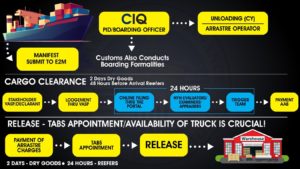
Assuming all import documents are in order, the Bureau of Customs (BOC) can limit the clearance process for containers to 24 hours to ensure unimpeded entry of goods during the enhanced community quarantine (ECQ), said Assistant Commissioner Philip Vincent Maronilla in the April 3 BOC live session.
Maronilla assured of faster processing and release of containers in the next few days in preparation for the issuance of BOC rules to implement Joint Administrative Order (JAO) 20-01 (Adoption of Processes for the Expedited Release of Refrigerated Containers and Dry Vans during the ECQ).
Under JAO 20-01, BOC should issue the final assessment of the goods thereby declared no later than 24 hours from the date of online filing of the goods declaration.
BOC should prioritize the processing of arriving cargoes, particularly foods, medicine, medical and basic necessities. It may also direct shipping lines to retain reefers on board the vessels and/or be sent back to the transshipment port.
Lodgment of and online filing of goods declaration by importers /consignees should be two days from the date of discharge. BOC will issue the final assessment on the goods thereby declared no later than 24 hours from the date of online filing of the goods declaration.
Imports/consignees should pay, preferably online, duties, taxes, and other charges within 24 hours from date of issuance of the final assessment by BOC.
Importers/consignees will have 24 hours to claim the goods from date of payment, or the goods will be declared abandoned.
BOC should also accept filing of provisional goods declaration in accordance with the Customs Modernization and Tariff Act (CMTA) and as implemented by Customs Memorandum Order No. 07-2020 (guidelines for granting tax and duty exemption on imported medical supplies and equipment needed to address the outbreak of the coronavirus disease in the Philippines).
BOC should also relax its selectivity process for food, medicine, medical and other basic necessities, and should adopt the “green lane” process flow for importers/consignees jointly identified with the DTI Bureau of Import Services (BIS), based on a set of criteria.
These identified importers/consignees will be subject to post-entry audit.
For dry vans, BOC should facilitate processing in accordance with its risk management and selectivity system.
BOC appealed to other agencies in the supply chain to carry out their respective roles under JAO 20-01 to prevent delays in shipment release leading to port congestion.
In a statement, Customs Commissioner Rey Leonardo B. Guerrero reiterated the importance of inter-agency cooperation to ensure proper implementation of the JAO.
“In order to avoid port congestion and ensure that shipments are released in timely manner, all agencies involved must collaborate and work in harmony” Guerrero said.
The BOC chief has already ordered the continuous operation of the Bureau through the Lenten season especially during Maundy Thursday and Good Friday via a skeleton staffing arrangement.









